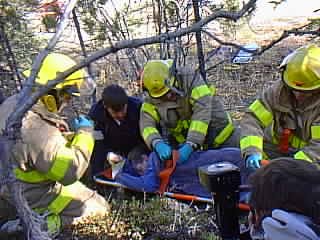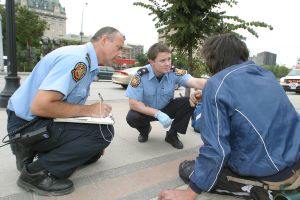First Responders are often the first professional health care providers on the scene of a medical or traumatic emergency, providing invaluable care until paramedics arrive to provide more advanced care and transport the patient to the hospital. To work as a First Responder in British Columbia you must be both certified and licensed.
The First Responder course we delivery provides a minimum of 60 hours of instruction, designed specifically to provide the necessary skills and knowledge to fulfill this role. The program includes both the Red Cross First Responder course and the EMALB Scope of Practice update, ensuring all of our students are trained to the level currently required by the Ministry of Health and the EMA Licensing Branch.
This course is used by fire departments and first response agencies throughout Canada to train their responders, and is also a pre-requisite to become a career firefighter.
Who is this course appropriate for?
The first responder role is usually provided by firefighters working for municipal fire departments, however police officers, coast guard staff, and search and rescue personnel also fill this role in some communities.
Becoming certified and licensed as a first responder is the first step to an exciting career in emergency medical response!
About the First Responder course:
All of our first responder courses are taught by veteran paramedics who have responded to tens of thousands of 911 calls. The course uses a mix of lecture, small group activities, skill stations and practical scenarios, allowing you to learn and practice first responder skills while working with pre-hospital care providers who have decades of experience.
Priority Care works with the same equipment used by providers in British Columbia’s 911 system (fire fighters and paramedics from BC EHS), which allows you to gain comfort and experience using the best first responder equipment available.
By the end of this course you will feel confident responding to care for car accident victims, people experiencing heart attacks, patients with fractures and spinal injuries, unconscious diabetics, and many more!
What will I learn about in this course?
- The Professional Responder
- Anatomy & Physiology
- Prevention of Disease Transmission
- Managing the Emergency Scene
- Patient Assessment (primary and secondary survey, including blood pressure assessment)
- Airway & Ventilation (including the use of oral airways, suction, oxygen therapy, pocket and bag valve masks)
- Respiratory Emergencies (including assisting with patient medications for asthma and anaphylaxis)
- Circulation Emergencies (including care of the chest pain patient, assisting with patient medications for chest pain, CPR and AED use)
- Shock & Bleeding (including tourniquet application)
- Head & spine injuries (including spinal rolls, helmet removal, hard collar application and spinal immobilization)
- Chest, Abdominal, and Pelvic Injuries
- Fractures & sprains
- Soft Tissue Injuries
- Sudden Medical Emergencies (including managing the diabetic patient)
- Environmental emergencies
- Poisons
- Special Populations
- Childbirth
- Crisis Intervention
- Reaching & Moving People
- Multiple Casualty Incidents
Course length?
The Red Cross First Responder course is made up of the following components:
- RECOMMENDED: A pre-read home study package (approximately 20 hours)
- MANDATORY: The Red Cross First Responder course, including all Schedule One and Schedule Two content from the new EMA Licensing Scope of Practice Update (a total of 4-8 hours of pre-classroom work plus 56 hours in classroom)
Course completion requirements:
Successful completion of the Canadian Red Cross First Responder Course is based upon:
- 100% attendance in the full First Responder process described above
- Completion of two practical scenarios (one medical and one trauma)
- A mark of 75% or better on a written knowledge examination
How long is the certificate good for?
Upon successful completion of the Canadian Red Cross First Responder course you will receive certification in First Responder, BLS CPR, and AED Use. These certifications are valid for 3 years, and are nationally recognized.
The licensing process:
Once certified, professional first responders working in the 911 system must also complete a separate set of exams to become licensed by the BC government’s Emergency Medical Assistant’s Licensing Board (the EMALB). The EMALB, part of the BC Government’s Ministry of Health, is the provincial regulatory body tasked with ensuring competency amongst prehospital care providers.
The examination process to become licensed involves:
- Successfully passing two practical scenarios (one medical and one trauma)
- Passing a written medical knowledge exam
- Pass a written jurisprudence exam
The EMALB allows Priority Care to conduct the licensing practical licensing exams on their behalf, and you will then be ready to write licensing’s online written exams and move on to providing care as a first responder in BC!
More information on becoming licensed as a first responder in BC can be found on the Emergency Medical Assistant’s Licensing Board’s website HERE.
How much does this course cost?
The First Responder course (including the full EMALB scope of practice update) costs $880 per participant with a digital copy of the Emergency Care manual (456 pages), or $1,020 with a full colour printed copy of the textbook.
A minimum billing of 8 participants will apply to private group courses, and the Red Cross allows a maximum of 12 participants in each class.
Priority Care is not running individual enrolment public First Responder courses at this time.
Our First Responder courses are offered on a group course basis, and are available throughout the Greater Vancouver area (Vancouver, Burnaby, New Westminster, Port Moody, Coquitlam, Port Coquitlam, Maple Ridge, Langley, Cloverdale, Surrey, White Rock, Delta, Richmond, North Vancouver, West Vancouver) and the Fraser Valley (Mission, Aldergrove, Abbotsford, Chilliwack).
Booking a group course:
If you would like to book a First Responder group course for your organization please CONTACT US.


